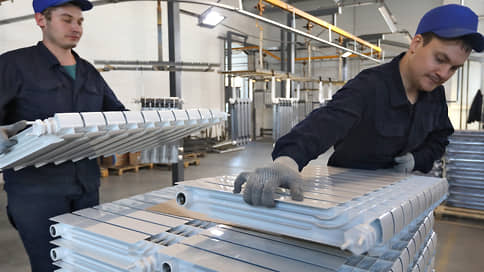Batteries are asking for a ruble – Newspaper Kommersant No. 171 (7372) of 09/16/2022
[ad_1]

The abolition of subsidies for transportation costs for the export of heating equipment has led to a decrease in the volume of deliveries to other countries from a number of manufacturers by several times. Market participants are asking to return this support, citing a decrease in business profitability and low capacity utilization, and it is not possible to compete in foreign markets with European and Chinese suppliers. But experts doubt that the authorities will support the export of heating products until their domestic competitiveness increases.
At the disposal of Kommersant was a letter from the Director General of the Eurasian Association of the Market for Heating Systems (EURAROS) Igor Prudnikov dated September 14 to the head of the Ministry of Industry and Trade Denis Manturov with a request to include aluminum and bimetallic radiators in the list of products whose manufacturers can receive subsidies from the state budget for transportation costs when exporting. The Ministry of Industry and Trade confirmed the receipt of the letter to Kommersant.
In 2019, the Ministry of Industry and Trade included heating equipment in the list of products whose manufacturers can receive subsidies for export logistics. Due to such state support, radiator manufacturers could cover up to 80% of logistics costs, EURAROS explains. But in August 2021, the authorities canceled export incentives for this sector due to rising global metal prices.
According to EURAROS, the government proceeded from the fact that exporters of metallurgical products are already making super profits, so state support measures are excessive. “But unlike such metallurgy giants as Severstal, NLMK, Norilsk Nickel, manufacturers of aluminum and bimetallic radiators have always teetered on the verge of profitability and did not have super profits,” says Alexander Maslov, chairman of the EURAROS expert council.
Andrey Lazurko, commercial director of KZTO Radiator, says that due to the abolition of subsidies, the profitability of the company’s business has decreased by 5-7%. According to him, the export of products this year has decreased four times, although it was planned to increase it three times. The general director of the Royal Thermo Rus plant, Sergey Shmakov, also says that the company has not been able to increase the volume of exports of products. A Kommersant source in a major manufacturer of heating equipment says that his company did not notice the abolition of subsidies, and the drop in exports “to almost zero” and the closure of offices in Europe occurred for geopolitical reasons.
In addition to increased logistics costs, the decline in exports is due to the high exchange rate of the ruble, which makes Russian-made radiators uncompetitive with European equipment, Andrey Lazurko explains. This problem also affected the domestic market. Due to the strengthening of the ruble, local manufacturers of heating systems began to lose competition in the Russian Federation to companies from China and Turkey, whose products cost 18–22% cheaper (see Kommersant on September 5). In addition, due to a decrease in demand for heating equipment in the Russian Federation, many manufacturers are underloaded, and some capacities are even idle, Mr. Lazurko adds.
Compensation of 80% of transport costs for export is a serious lever for increasing competitiveness in the CIS markets, in particular in Belarus and Kazakhstan, where Chinese manufacturers have a significant share, Sergei Shmakov notes. “But now we cannot offer customers from these countries more comfortable delivery conditions and low prices,” he explains.
Due to the cessation of Russian gas supplies to the EU, since the beginning of 2022, the demand for heating appliances in Europe has sharply increased, the main supplier of which is China, the NEO Center partner notes. Russian producers see potential in exports and want to act as an alternative supplier, and with the approaching winter and an even greater increase in demand, the state support measure will be relevant, she believes.
Without state support, radiator manufacturers will not be able to oust foreign competitors in foreign markets, but now one should not expect export stimulation in this industry, Vladislav Preobrazhensky, executive director of the Moscow Investors Club (unites developers), predicts. In his opinion, the state should support the increase in the competitiveness of local products, first on the domestic market, and only then on the world market.
[ad_2]
Source link





